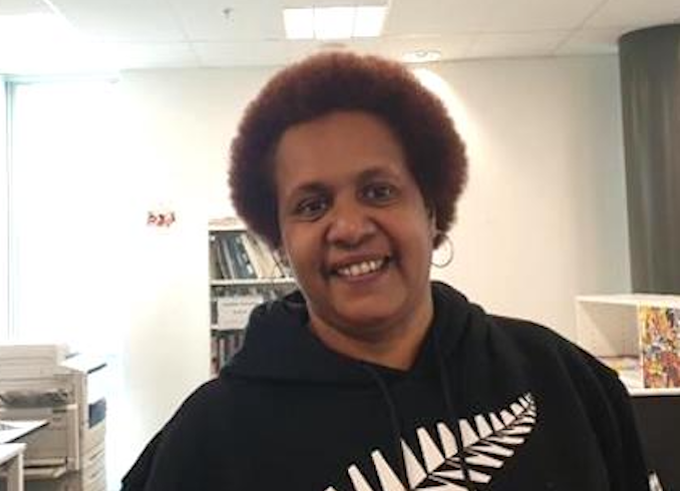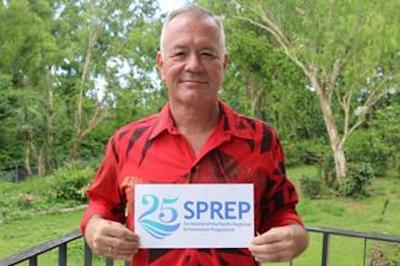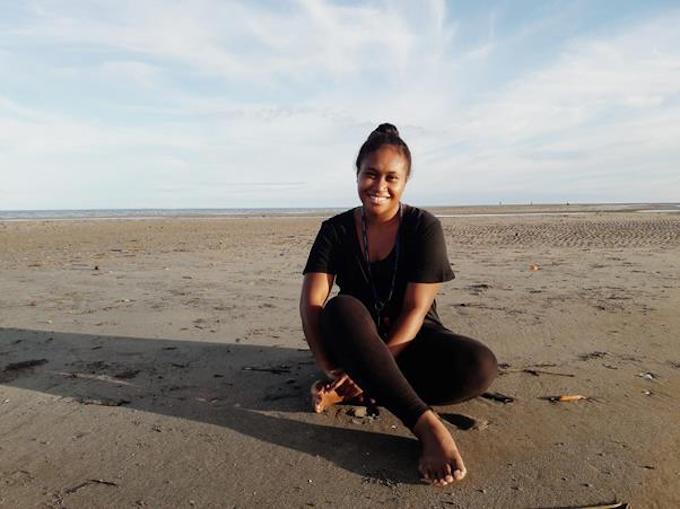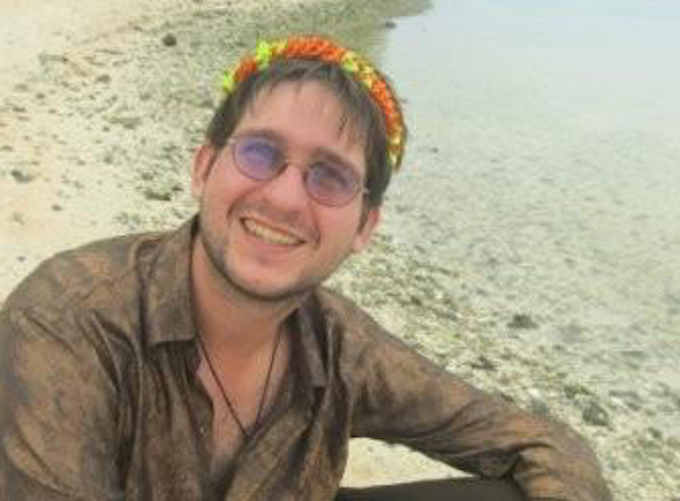
By Sri Krishnamurthi, reporting for the Pacific Media Centre
“Climate change may be slower but its momentum is enormous.” – Stuart Chape, Acting Director-General, South Pacific Regional Environmental Programme (SPREP).
Does anyone remember Greta Thunberg, the young Swedish environmentalist who caused a worldwide climate change stir – particularly among the neoliberal believers – but was voted Time magazine Person of the Year 2019 for her actions before the coronavirus pandemic struck?
It all seems so long ago now that we have a new age of covid-19, but wait, her pleas last year in front of the United Nations served as a warning as does the call from Stuart Chape, Acting Director-General of SREP, late in June 2020 that climate change is still a stark reality – especially for the Pacific.
The momentum for climate change might have slowed, but it still looms larger than life as economies open up again producing greenhouse gases.
READ MORE: InfoPacific – the geojournalism project
As Stephanie Sageo-Tapungu, a doctorate candidate from the seaside town of Madang in Papua New Guinea, says:
“The sea levels are still rising, and the climate is unpredictable now, so we cannot be really sure or predict ‘like this is what is going to happen’.
“The sea levels are going really high; parts of the islands are under the sea and I’ve seen that firsthand because it is happening in my Madang province.”

Sageo-Tapungu adds: “Having a closed economy and other activities did a lot of good when it comes to climate change, but I think it put a lot of strain on people and that can lead to a lot of social problems such as the crime rate going up.”
Illegal logging
Laurens Ikinia, a West Papuan masters student, studying in Aotearoa New Zealand, says that while covid-19 has slowed climate change, his major concern is the illegal logging going on back home in his Indonesian-ruled province.
“A year ago, the governors of his province were invited to attend events held in Florencia, the capital of Caquetá department in the Colombian Amazon, for the civil society, indigenous and local communities, national governments, and international donors for the 2019 annual meeting of the Governors’ Climate and Forests (GCF) Task Force,” Ikinia says.
“We have forests that are the second-largest producers of oxygen in the world.

“However, I would say because they have been given special autonomy to logging with regulations – and it is still happening in West Papua – so you have to say authorities are not really committed to the climate change agreements,” he says.
“In terms of covid-19 we don’t really know the outcomes or the impacts it has had on climate change because it is just too early to see any reports done on it even though you are aware that covid-19 would bring some good results of in terms of carbon dioxide sinks.
“But when it comes to the economy, from reports I’ve heard in recent days people are being affected by this pandemic and the local communities, unfortunately, cannot survive without help from the government,” he says.
However, SREP’s climate change advisor Espen Ronneberg maintains work is ongoing to address the issues which were thrashed out at the Conference of Parties to the 1992 United Nations Framework Convention on Climate Change (COP23) in Bonn, Germany.
Pledge to phase out coal
Countries pledged to phase out the use of coal and bring global temperatures down by 1.5 degrees centigrade.
Chaired by Fiji Prime Minister Voreqe Bainimarama, the summit offered high hopes of gaining solutions and agreements.
However, the Nationally Determined Contributions (countries) (NDCs) continued working against the smaller fragile nations.

Ronneberg says work is still needed, and is going at present in spite of no face-to-face meetings, and technical support is being done remotely – or in some cases where there is in-country expertise (like consultants) they are able to assist SPREP which also faced challenges to get equipment shipped.
He adds that covid-19 has demonstrated a new global phenomenon which has impacted not just on climate change but on social and environmental structures.
“Dramatically so – this has impacted on economic, social, and environmental scales/levels, and is what we have been saying about climate change for decades,” he says.
“Even though the most conservative estimates anticipate historic declines in carbon emissions this year because of the pandemic, the atmosphere continues to be loading up on too much carbon,” he says.
Claims backed up by lab reports
Ronneberg backs up his claims from lab reports such as that in Hawai’i.
“Atmospheric observations and measurements from labs such as that in Hawaii are observing that we are not seeing dramatic reductions in road transport emissions, nor from electricity generation, only flights and some maritime. Recall, the atmosphere takes quite some time to react to emissions – it’s a fairly turbid system, and gases can linger for many years as well,” he says.
Andrea Ma’ahanua, a Solomon Islander and the education chairperson at the University of the South Pacific (USP) Students Association in Fiji, says she personally believes that covid-19 has impacted on climate change initiatives in her country in various ways.

“Climate change initiative proposals would have to be put on hold due to the current COVID-19 situation. Due to travel restrictions, expatriates with technical knowledge in this area cannot travel into the country to help facilitate climate change initiatives,” she says.
“Furthermore, movement of locals has been restricted due to the imposed lockdown and in addition, funding initially allocated to climate change initiatives would most likely be diverted to covid-19 related initiatives and activities,
“That is evidently a priority under current circumstances. Therefore, this would result in the decline in climate change initiatives within the country.”
The world’s dependency on each other had greatly impacted on people she went on to say.
Rapid covid-19 spread
“The rapid spread of covid-19 around the world and its impact on our way of life, social structures and economies indicate how globalisation has created interdependency between world states,” she says.
“This global phenomenon has altered our way of life in terms of loss of jobs, a decline in economic activities and restrictions on people’s freedom of movement.
“All activities have ultimately come to a standstill or been changed accordingly to align with current covid-19 regulations.
“This is apparent in the Solomon Islands, where government revenue has substantially decreased as a result of the decline in economic activities. Furthermore, locals struggle to support their families under the current situation and there has been a noticeable movement of people from urban areas to rural villages in face of this economic hardships,” she says.
“In regard to the re-opening of borders to keep climate change down, I personally believe governments should continue to impose movement restrictions.”
In order to keep the Solomon Islands economy afloat, the government must allow technical staff specialised in the field of climate change or other key economic areas to enter the country, she believes.
And, yes, she thinks climate change has been pushed into the background by covid-19.
Less focus on climate
“I personally observed less focus on climate change initiatives in the Solomon Islands under the of covid-19 situation. More and more stories being published in the Solomon Islands in previous months have been centred on covid-19 regulations and the state of emergency [SOE].
“In previous meetings, climate change was regarded as the utmost priority on the discussion table. However, given the covid-19 phenomenon, there has been a major shift of government attention toward covid-19 preventative measures. This means that climate change would be viewed as the last item of priority on the discussion table,” she says.
However, Richard Clark, who is the Special Assistant to the President (David Panuelo) and Public Information Officer for the Federated States of Micronesia, says climate change initiatives have continued to grow but at a slower pace.
“An example of continuing accomplishments is that in July 2020, President David Panuelo signed Public Law 21-76 which formally prohibited the importation of styrofoam and one-time-use plastic bags,” he says.
“However, the nations’ Blue Prosperity Micronesia programme – which intends to protect 30 percent of the nation’s marine resources – has delayed its scientific expedition until 2021.”

The Federated States of Micronesia is less dependent on air travel and therefore affected less in climate change pollution from that source, as they are from shipping, he says.
“The short answer is that air travel makes up an an incredibly small footprint in global greenhouse emissions. The global shipping industry – on which the FSM is reliant – and the energy sector at large make up the overwhelming majority of emissions,” he says.
Covid-free daily life remains
“As the FSM remains covid-19 free, daily life and structures remain largely the same. However, the pandemic has crippled the tourism sector with approximately 70 percent of formal employees in the sector either unemployed or at significantly reduced hours,” he says of the impact of the coronavirus pandemic globally on daily life.
“The FSM’s largest sources of revenue are through fisheries and through the Compact of Free Association, so from a purely government perspective the economic impacts have not been felt as hard – yet,” he says
“The price of tuna has decreased substantially, which will affect the Pacific region’s fisheries revenues in the next fiscal year. The nation projects a substantial economic decline,” he says.
However, Clark has an opinion too to offer those who would weigh up re-opening the economy as opposed to staying covid-19 safe as a way to keep climate change down?
“The covid-19 pandemic doesn’t play a significant role in fixing the world’s issues with climate change.
“President Panuelo is of the view that economies can die and be revived but human beings cannot be.
“The broader public opinion in the FSM is that the nation ought to keep its borders closed until a vaccine is prepared, but the focus there is on human health. environmental health, by contrast, has not yet arrived in the discussions in either the National Covid-19 Task Force or in the president’s meetings with his Cabinet,” he says.
Backward step? – yes and no
And has he seen evidence of climate change initiatives taking a backward step in the face of covid-19?
“In some respects, yes – and in some respects, no,” he says.
“In the answer of yes: covid-19 has delayed the construction and implementation of the integrated coconut processing facility in Tonoas, Chuuk, which beyond adding significant economic growth to the nation as arguably its most promising development opportunity, would also power Tonoas with sustainable energy,” he says.
“In the answer no: in July 2020 the nation prohibited the importation of styrofoam and one-time-use plastic bags; other climate change related initiatives remain ongoing.”
So, while Pacific countries remained constrained by covid-19, their ambitions to curb climate change remains a very large factor at the back of their minds.
This is the third of a series of articles by the Pacific Media Centre’s Pacific Media Watch as part of an environmental project funded by the Internews’ Earth Journalism Network (EJN) Asia-Pacific initiative.













































